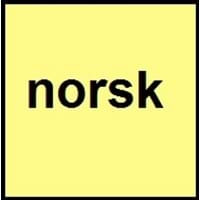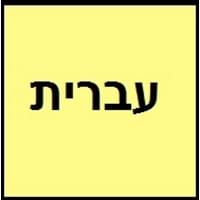Norwegian vs Hebrew
National Language
Norway
Israel
Second Language
Not spoken in any of the countries
Israel
Speaking Continents
Europe, South America
Africa, Asia, Europe
Minority Language
Nynorsk
Poland
Regulated By
Norwegian Language Council
Academy of the Hebrew Language
Interesting Facts
- Bergen is one of the Norwegian dialect which has only two genders: common and neuter.
- Since Norwegian language uses pitch accents, it has musical quality and are sometimes employed to distinguish the meanings of homonyms.
- The original language of Bible is Hebrew.
- The men and women use different verbs in hebrew language.
Similar To
Swedish and Danish Languages
Arabic and Aramaic languages
Derived From
Not Available
Aramaic Language
Alphabets in
Norwegian-Alphabets.jpg#200
Hebrew-Alphabets.jpg#200
Writing Direction
Left-To-Right, Horizontal
Right-To-Left, Horizontal
Hello
hallo
שלום (Shalom)
Thank You
takk
תודה (Toda)
How Are You?
hvordan har du det?
מה שלומך? (ma shlomxa)
Good Night
god natt
לילה טוב (Laila tov)
Good Evening
god kveld
ערב טוב (Erev tov)
Good Afternoon
god ettermiddag
אחר צהריים טובים (Achar tzahara'im tovim)
Good Morning
god morgen
בוקר טוב (Boker tov)
Please
Vær så snill
בבקשה (bevekshah)
Sorry
unnskyld
סליחה! (Slicha)
Bye
ha det
להתראות (Lehitraot)
I Love You
Jeg Elsker Deg
אני אוהבת אותך (Ani ohevet otcha)
Excuse Me
unnskyld meg
בבקשה!
Dialect 1
Jamtlandic
Ashkenazi Hebrew
Where They Speak
Jamtland,Harjedalen
Israel
How Many People Speak
Not Available
Dialect 2
Sognamål
Samaritan Hebrew
Where They Speak
Sogn
Israel, Palestine
Dialect 3
Hallingmål-Valdris
Yemenite Hebrew
Where They Speak
Hallingdal, Valdres
Israel
Speaking Population
Not Available
Not Available
Second Language Speakers
Not Available
Native Name
Norsk
עברית / עִבְרִית (ivrit)
Alternative Names
Norsk
Israeli, Ivrit
French Name
norvégien nynorsk; nynorsk, norvégien
hébreu
German Name
Nynorsk
Hebräisch
Pronunciation
[nɔʂk] (Eastern Norwegian)
[nɔʁsk] (Western Norwegian)
[(ʔ)ivˈʁit] - [(ʔ)ivˈɾit]
Ethnicity
Norwegians
Not Available
Origin
c. 1300 AD
1000 BC
Language Family
Indo-European Family
Afro-Asiatic Family
Subgroup
Germanic
Semitic
Branch
Northern (Scandinavian)
Canaanitic
Early Forms
Old Norse language, Old Norwegian, Middle Norwegian, Modern Norwegian
Biblical Hebrew, Mishnaic Hebrew, Medieval Hebrew, Hebrew
Standard Forms
Nynorsk, Bokmål
Modern Hebrew
Language Position
Not Available
Signed Forms
Signed Norwegian
Signed Hebrew
Scope
Macrolanguage
Individual
ISO 639 6
Not Available
Not Available
Glottocode
norw1258
hebr1246
Linguasphere
52-AAA-ba to -be; 52-AAA-cf to -cg
12-AAB-a
Language Type
Living
Living
Language Linguistic Typology
Subject-Verb-Object
Subject-Verb-Object, Verb-Subject-Object
Language Morphological Typology
Fusional
Fusional, Synthetic
Norwegian and Hebrew Language History
Comparison of Norwegian vs Hebrew language history gives us differences between origin of Norwegian and Hebrew language. History of Norwegian language states that this language originated in c. 1300 AD whereas history of Hebrew language states that this language originated in 1000 BC. Family of the language also forms a part of history of that language. More on language families of these languages can be found out on Norwegian and Hebrew Language History.
Norwegian and Hebrew Greetings
People around the world use different languages to interact with each other. Even if we cannot communicate fluently in any language, it will always be beneficial to know about some of the common greetings or phrases from that language. This is where Norwegian and Hebrew greetings helps you to understand basic phrases in Norwegian and Hebrew language. Norwegian word for "Hello" is hallo or Hebrew word for "Thank You" is תודה (Toda). Find more of such common Norwegian Greetings and Hebrew Greetings. These greetings will help you to be more confident when conversing with natives that speak these languages.
Norwegian vs Hebrew Difficulty
The Norwegian vs Hebrew difficulty level basically depends on the number of Norwegian Alphabets and Hebrew Alphabets. Also the number of vowels and consonants in the language plays an important role in deciding the difficulty level of that language. The important points to be considered when we compare Norwegian and Hebrew are the origin, speaking countries, language family, different greetings, speaking population of these languages. Want to know in Norwegian and Hebrew, which language is harder to learn? Time required to learn Norwegian is 24 weeks while to learn Hebrew time required is 44 weeks.





